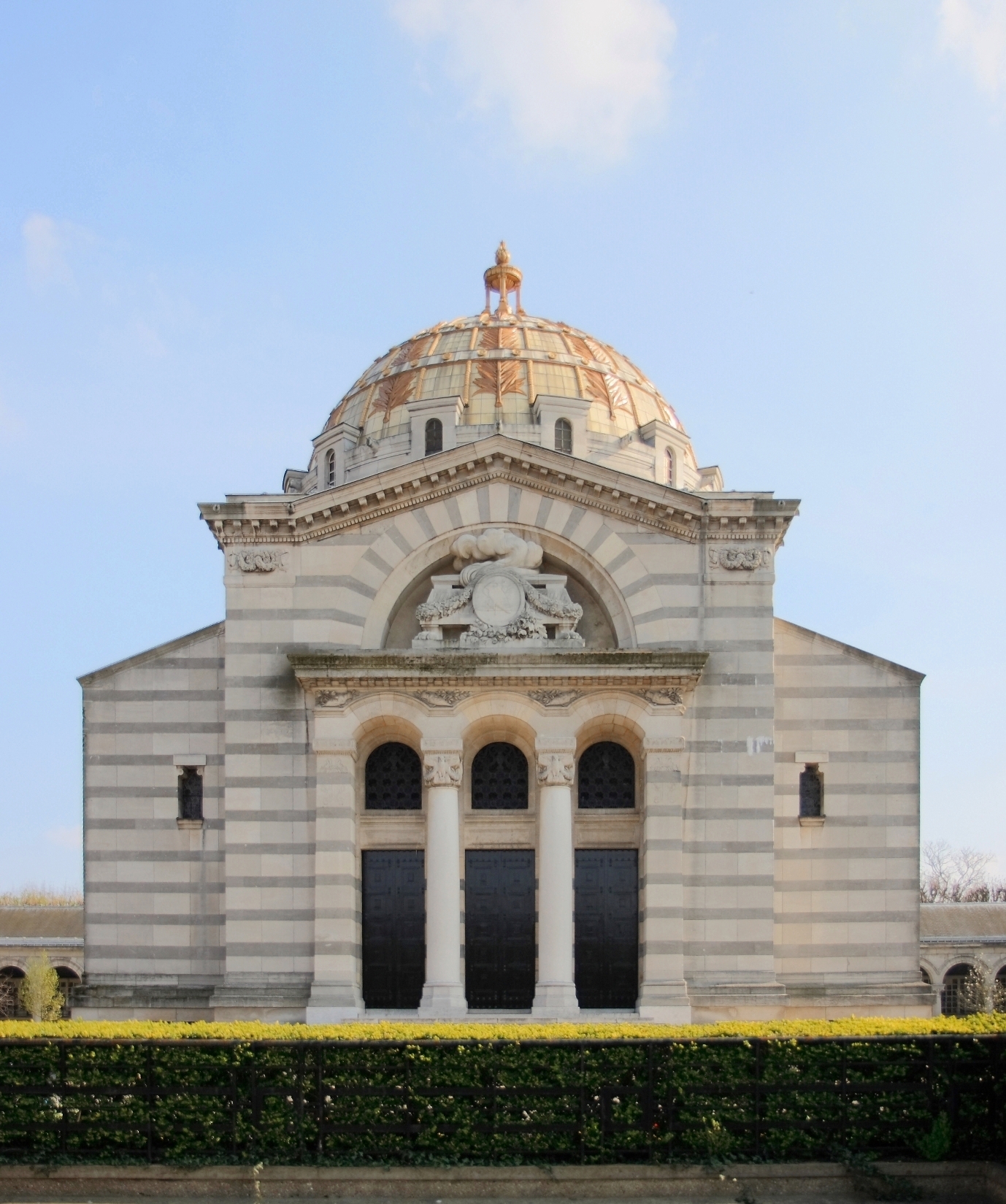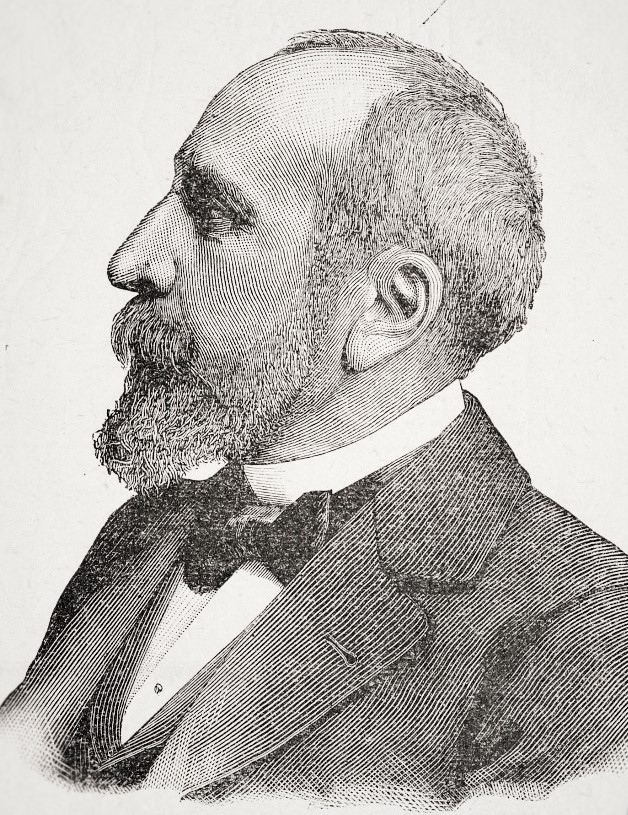|
Emil Jungfleisch
Prof Emil Clement Jungfleisch FRSE MIF (1839-1916) was a French biochemist and pharmacist. He studied molecular dissymmetry. Life He was born in Paris on 21 December 1839. He studied at the Ecole Superieure de Pharmacie in Paris. He gained a BSc in Sciences in 1866. In 1869 he began assisting at his alma mater in Paris and in 1876 was made Professor of Organic Chemistry. In 1908 he succeeded Pierre Eugene Marcellin Berthelot as Professor of Chemistry at the College of France. In 1880 he was elected a member of the National Academy of Medicine and a member of the Academy of Sciences in 1909. In 1913 he was elected an Honorary Fellow of the Royal Society of Edinburgh. He died on 24 April 1916. He is buried in the 25th Division of Père Lachaise Cemetery in Paris. Artistic recognition In 1910 he was sculpted in profile by Paul Richer Paul Marie Louis Pierre Richer (17 January 1849 – 17 December 1933) was a French anatomist, physiologist, sculptor, medallist, and anatomical ... [...More Info...] [...Related Items...] OR: [Wikipedia] [Google] [Baidu] |
FRSE
Fellowship of the Royal Society of Edinburgh (FRSE) is an award granted to individuals that the Royal Society of Edinburgh, Scotland's national academy of science and letters, judged to be "eminently distinguished in their subject". This society received a royal charter in 1783, allowing for its expansion. Elections Around 50 new fellows are elected each year in March. there are around 1,650 Fellows, including 71 Honorary Fellows and 76 Corresponding Fellows. Fellows are entitled to use the post-nominal letters FRSE, Honorary Fellows HonFRSE, and Corresponding Fellows CorrFRSE. Disciplines The Fellowship is split into four broad sectors, covering the full range of physical and life sciences, arts, humanities, social sciences, education, professions, industry, business and public life. A: Life Sciences * A1: Biomedical and Cognitive Sciences * A2: Clinical Sciences * A3: Organismal and Environmental Biology * A4: Cell and Molecular Biology B: Physical, Engineering an ... [...More Info...] [...Related Items...] OR: [Wikipedia] [Google] [Baidu] |
Paris
Paris () is the capital and most populous city of France, with an estimated population of 2,165,423 residents in 2019 in an area of more than 105 km² (41 sq mi), making it the 30th most densely populated city in the world in 2020. Since the 17th century, Paris has been one of the world's major centres of finance, diplomacy, commerce, fashion, gastronomy, and science. For its leading role in the arts and sciences, as well as its very early system of street lighting, in the 19th century it became known as "the City of Light". Like London, prior to the Second World War, it was also sometimes called the capital of the world. The City of Paris is the centre of the Île-de-France region, or Paris Region, with an estimated population of 12,262,544 in 2019, or about 19% of the population of France, making the region France's primate city. The Paris Region had a GDP of €739 billion ($743 billion) in 2019, which is the highest in Europe. According to the Economis ... [...More Info...] [...Related Items...] OR: [Wikipedia] [Google] [Baidu] |
Pierre Eugene Marcellin Berthelot
Pierre Eugène Marcellin Berthelot (; 25 October 1827 – 18 March 1907) was a French chemist and Republican politician noted for the ThomsenBerthelot principle of thermochemistry. He synthesized many organic compounds from inorganic substances, providing a large amount of counter-evidence to the theory of Jöns Jakob Berzelius that organic compounds required organisms in their synthesis. Berthelot was convinced that chemical synthesis would revolutionize the food industry by the year 2000, and that synthesized foods would replace farms and pastures. "Why not", he asked, "if it proved cheaper and better to make the same materials than to grow them?" He was considered "one of the most famous chemists in the world." Upon being appointed to the post of Minister of Foreign Affairs for the French government in 1895, he was considered "the most eminent living chemist" in France. In 1901, he was elected as one of the "Forty Immortals" of the Académie française. He gave all his dis ... [...More Info...] [...Related Items...] OR: [Wikipedia] [Google] [Baidu] |
Royal Society Of Edinburgh
The Royal Society of Edinburgh is Scotland's national academy of science and letters. It is a registered charity that operates on a wholly independent and non-partisan basis and provides public benefit throughout Scotland. It was established in 1783. , there are around 1,800 Fellows. The Society covers a broader selection of fields than the Royal Society of London, including literature and history. Fellowship includes people from a wide range of disciplines – science & technology, arts, humanities, medicine, social science, business, and public service. History At the start of the 18th century, Edinburgh's intellectual climate fostered many clubs and societies (see Scottish Enlightenment). Though there were several that treated the arts, sciences and medicine, the most prestigious was the Society for the Improvement of Medical Knowledge, commonly referred to as the Medical Society of Edinburgh, co-founded by the mathematician Colin Maclaurin in 1731. Maclaurin was unhap ... [...More Info...] [...Related Items...] OR: [Wikipedia] [Google] [Baidu] |
Père Lachaise Cemetery
Père Lachaise Cemetery (french: Cimetière du Père-Lachaise ; formerly , "East Cemetery") is the largest cemetery in Paris, France (). With more than 3.5 million visitors annually, it is the most visited necropolis in the world. Notable figures in the arts buried at Père Lachaise include Michel Ney, Frédéric Chopin, Émile Waldteufel, Édith Piaf, Marcel Proust, Georges Méliès, Marcel Marceau, Sarah Bernhardt, Oscar Wilde, Thierry Fortineau, J.R.D. Tata, Jim Morrison and Sir Richard Wallace. The Père Lachaise is located in the 20th arrondissement and was the first garden cemetery, as well as the first municipal cemetery in Paris. It is also the site of three World War I memorials. The cemetery is located on the Boulevard de Ménilmontant. The Paris Métro station Philippe Auguste on Line 2 is next to the main entrance, while the station Père Lachaise, on both Line 2 and Line 3, is 500 meters away near a side entrance. History and description Origin The cemetery of ... [...More Info...] [...Related Items...] OR: [Wikipedia] [Google] [Baidu] |
Paul Richer
Paul Marie Louis Pierre Richer (17 January 1849 – 17 December 1933) was a French anatomist, physiologist, sculptor, medallist, and anatomical artist who was a native of Chartres. He was a professor of artistic anatomy at the École nationale supérieure des Beaux-Arts in Paris, as well as a member of the Académie Nationale de Médecine (1898). Richer was an assistant to Jean-Martin Charcot at the Salpêtrière, and from 1882 to 1896 was chief of the laboratory at the Salpêtrière Hospital. With Charcot he performed research of hysteria and epilepsy, and also performed studies of medicine and its relationship to art. In 1903, Richer was appointed to the chair of artistic anatomy at the École des Beaux-Arts, and in 1907-08 was president of the ''Société Française d'Histoire de la Médecine'' (French Society for the History of Medicine). His sculptures can be found in museums throughout Europe, including the Musée d'Orsay. His work was part of the sculpture event in the ... [...More Info...] [...Related Items...] OR: [Wikipedia] [Google] [Baidu] |
1839 Births
Events January–March * January 2 – The first photograph of the Moon is taken, by French photographer Louis Daguerre. * January 6 – Night of the Big Wind: Ireland is struck by the most damaging cyclone in 300 years. * January 9 – The French Academy of Sciences announces the daguerreotype photography process. * January 19 – British forces Aden Expedition, capture Aden. * January 20 – Battle of Yungay: Chile defeats the Peru–Bolivian Confederation, leading to the restoration of an independent Peru. * January – The first parallax measurement of the distance to Alpha Centauri is published by Thomas Henderson (astronomer), Thomas Henderson. * February 11 – The University of Missouri is established, becoming the first public university west of the Mississippi River. * February 24 – William Otis receives a patent for the steam shovel. * March 5 – Longwood University is founded in Farmville, Virginia. * March 7 – Baltimore City College, the third public high ... [...More Info...] [...Related Items...] OR: [Wikipedia] [Google] [Baidu] |
1916 Deaths
Events Below, the events of the First World War have the "WWI" prefix. January * January 1 – The British Empire, British Royal Army Medical Corps carries out the first successful blood transfusion, using blood that had been stored and cooled. * January 9 – WWI: Gallipoli Campaign: The last British troops are evacuated from Gallipoli, as the Ottoman Empire prevails over a joint British and French operation to capture Constantinople. * January 10 – WWI: Erzurum Offensive: Russia defeats the Ottoman Empire. * January 12 – The Gilbert and Ellice Islands Colony, part of the British Empire, is established in present-day Tuvalu and Kiribati. * January 13 – WWI: Battle of Wadi (1916), Battle of Wadi: Ottoman Empire forces defeat the British, during the Mesopotamian campaign in modern-day Iraq. * January 29 – WWI: Paris is bombed by German Empire, German zeppelins. * January 31 – WWI: An attack is planned on Verdun, France. February * ... [...More Info...] [...Related Items...] OR: [Wikipedia] [Google] [Baidu] |
Members Of The Académie Française
Member may refer to: * Military jury, referred to as "Members" in military jargon * Element (mathematics), an object that belongs to a mathematical set * In object-oriented programming, a member of a class ** Field (computer science), entries in a database ** Member variable, a variable that is associated with a specific object * Limb (anatomy), an appendage of the human or animal body ** Euphemism for penis * Structural component of a truss, connected by nodes * User (computing), a person making use of a computing service, especially on the Internet * Member (geology), a component of a geological formation * Member of parliament * The Members, a British punk rock band * Meronymy, a semantic relationship in linguistics * Church membership, belonging to a local Christian congregation, a Christian denomination and the universal Church * Member, a participant in a club or learned society A learned society (; also learned academy, scholarly society, or academic association) is ... [...More Info...] [...Related Items...] OR: [Wikipedia] [Google] [Baidu] |
Academic Staff Of The Collège De France
An academy (Attic Greek: Ἀκαδήμεια; Koine Greek Ἀκαδημία) is an institution of secondary or tertiary higher learning (and generally also research or honorary membership). The name traces back to Plato's school of philosophy, founded approximately 385 BC at Akademia, a sanctuary of Athena, the goddess of wisdom and skill, north of Athens, Greece. Etymology The word comes from the ''Academy'' in ancient Greece, which derives from the Athenian hero, ''Akademos''. Outside the city walls of Athens, the gymnasium was made famous by Plato as a center of learning. The sacred space, dedicated to the goddess of wisdom, Athena, had formerly been an olive grove, hence the expression "the groves of Academe". In these gardens, the philosopher Plato conversed with followers. Plato developed his sessions into a method of teaching philosophy and in 387 BC, established what is known today as the Old Academy. By extension, ''academia'' has come to mean the accumulation, dev ... [...More Info...] [...Related Items...] OR: [Wikipedia] [Google] [Baidu] |








